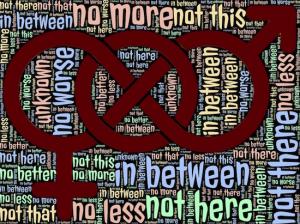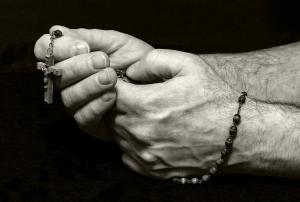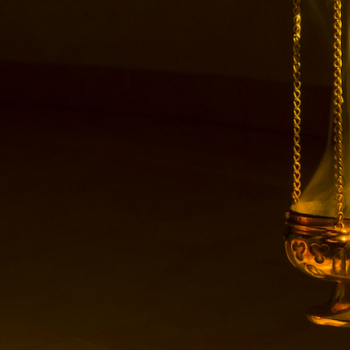I Came Here to Chew Bubblegum and Yell at People
A few days ago, there was some Twitter drama about some of the details of Side B theology. I gather it was prompted, at least in part, by some tweets by Grant Hartley (a man who is unfailingly kind and sweet to literally everyone). The backlash was predictably bad.

Image from Twitter user @freezydorito
I was so frustrated—and, to my surprise, so hurt—by the way people were talking that I wanted to write one of my obnoxious forty-tweet threads. However, I knew if I did so right then, it would only make everything worse. And on reflection, I decided a Twitter thread, with its endless possibilities of interruption and distraction, wouldn’t really help. So I wrote this instead, to try and articulate why I felt the way I did, in the hope that it might contribute to greater mutual understanding between Side A and Side B Christians in the long run.
Please note, though, that this isn’t an apologetics post or anything of that kind. This is an attempt to express some ways that (I feel) Side B is misunderstood and even, sometimes, unfairly treated by a lot of Side A people. As such, it may not be an equally fun read for everybody. I can only hope that I haven’t been unfair myself.
It’s a Spectrum
First, I don’t flatter myself that I can speak for Side B in general. There are some people, like Eve Tushnet or Bridget Rivera, that I practically never find myself disagreeing with in either tone or content. There are others, whom courtesy moves me not to name, that I privately wish wouldn’t even claim the Side B label. But that’s not mine to decide; Side B is an umbrella. Its defining characteristics are:
- believing Christian marriage is meant only for one man and one woman
- rejecting conversion therapy
That’s it. There are lots of other beliefs about queerness that I consider important; but I have neither the wish nor the power to deny other people the term “Side B” (which, after all, I didn’t come up with) because they don’t agree with me about those other things.
I actually suggested, a few years back, that the conservative “wing” of Side B—the people who, while still not endorsing ex-gay stuff, considered LGBTQ terminology and identity suspect at best, if not positively wrong—should have a separate designation. I proposed Side Y (partly because A and B formed a natural-sounding pair, and the natural-sounding pair with X would be Y; partly also because it allowed me to make a lame joke about video game controls in the blog post where I suggested it). However, this never really caught on: a lot of people didn’t seem to see the distinction I was making, and were confused by the term. I’ve kind of come to question its usefulness myself.
But I’m straying from my subject. The general point here is, Side B has internal diversity, and I’m not claiming that my personal convictions and “Side B beliefs” are interchangeable.
The Locus of Discussion
Second, the issue of whom Side B is “speaking to” is key. E.g., when the Nicene Fathers took up the term homoousion, they were speaking to the Arians, not to the Sabellians who thought of all three persons of the Trinity as just different aspects or roles. I get the impression that a lot of Side A believers believe Side B is speaking to them in particular and also LGBTQ people in general—or even that Side B is basically a kind of evangelization program.
I’m sure Side B people who think like that exist, though it may be significant that I can’t think of any. Speaking for both my own motives and the actual behavior of most of the Side B people I personally know or have read, Side A really isn’t our primary concern. The issue for us is getting our own churches to accept us and to quit pushing ex-gay crap. What we’re trying to do is carve out space for people like ourselves, people sincerely convinced of what’s loosely called “the traditional sexual ethic” but who are nevertheless stone-cold gay. If we weren’t, there are a lot of much easier paths we could be taking!
Of course I don’t expect that to make most Side A people much happier about our theology; and, sorry, but I don’t greatly care, because the principal conversation we’re having isn’t about you. We have our own lives we’re trying to live.
Preacher Man
Nor, I will venture to add, are Side A people immune to the evangelistic attitude. I can’t tell you how many times (and omitting names again seems courteous) I’ve had Side A Christians tell me—both friends and perfect strangers, in private and in public—that I “shouldn’t have to live without love” and “don’t have to worship where I’m not wanted” and so on. Do you really not see how fucking condescending that is? As if I’m espousing a set of very costly beliefs because it merely hadn’t occurred to me to agree with you? As if I could just decide that I no longer find my deeply held beliefs important or convincing?
Now, I’m definitely bringing in lots of my own baggage here. I rarely react well to emotional appeals; they set off alarm bells for me, for a bunch of reasons, and tend to make me feel really intruded upon. Yet I do recognize that a huge part of the reason Side A Christians use phrases like these is that they rightly hate to see people suffering, especially people they care about, and above all if they’re deeply convinced that that suffering isn’t necessary.
But here’s the thing. Whether the suffering is necessary is exactly the point that B and A theologies disagree on. It’s no hypocrisy for you to be moved by a sincere conviction that your beliefs are true, of course; but it’s a blatant fallacy to tell someone else “your suffering is unnecessary because that’s what I believe about it.” You want to offer me arguments, go right ahead, but don’t come to me with that.

Incidentally, this is also part of the reason I so rarely talk in detail about my own reasons for being Side B. Another concern I have is with my reasons being ripped from their context and misused, by straight Christians or even by ex-gay ideologues. But there’s also the plain fact that I have no reason to think most of my Side A friends would find my reasons persuasive or even interesting.
“But,” you may say, “isn’t it your duty to persuade Side A people that their theology is wrong? They’re living in sin, after all!” I mean … no? If a person is sincerely convinced of their beliefs, I may consider those beliefs mistaken, but I’m certainly not worried about them. The way sin, knowledge, and responsibility interact with each other is actually a pretty subtle thing, and it takes some discernment to know what’s going on even in your own heart, let alone somebody else’s. What their responsibility is before God is God’s to judge. And I’m not a priest, so I have not been assigned the responsibility of expounding truths even when it’s not my personal business. I do not believe that the universal call to holiness was meant to make each individual Catholic a freelance moral instructor to passersby.
If I had a close friend approach me, based on their trust in me as a person and as a Christian, and ask what I thought about a given theological or moral question—sure, I’d probably try to answer. But that would be because we were friends, talking in private, and they asked me.
The Joy of Pedantry
Okay. So what about this whole “Side B doesn’t say gay people have to be celibate because they can still enter a mixed-orientation marriage” business? This requires some delicacy. First of all, yes, it is true: Side B does involve the belief that mixed-orientation marriages are licit. But that calls for some unpacking.
First of all, what counts as a mixed-orientation marriage? Any marriage between people who don’t have the same orientation meets the technical definition. As someone in Grant’s thread pointed out, asexuals who marry heterosexuals are, strictly speaking, in MOMs, which means careless words about MOMs can have implications for ace people down the line (and ace people get erased and pathologized quite enough as it is, they don’t need any more shit—the fact that I saw Side A people ignoring this seriously pissed me off). A marriage between a bisexual and a heterosexual meets the technical definition too, even if some of us feel that that sounds like playing MOM on easy mode. Not being bisexual myself, I don’t feel like I have a good idea of what the peculiar challenges of a bi-hetero pairing would be, so I won’t say any more about that.
I Am Not Here for Anne Paulk
But what’s normally meant is a marriage between a gay man or lesbian and a heterosexual woman or man—or between a gay man and a lesbian. Like many Side B people and virtually all of Side A, I think MOMs of this kind are usually an extremely bad idea, and it worries and angers me that so many Christians so enthusiastically promote them. (Eve Tushnet touched on some of the problems that tend to characterize MOM promotion in her own, much nicer, response post to the recent drama.) But I’m not prepared to call them sinful as such, and I think the reasons why are really important.
For one thing, as one or two people pointed out, not every gay man or lesbian is a Kinsey 6; people use these labels a little more loosely than that. Moreover, some people experience a certain amount of fluidity. There are going to be outliers who really do find the one woman or the one man that they’d cross orientations for, not because heterosexuals are magic, but because the realities of our attractions are not always as neat as the labels we use. Like I said, I don’t expect exceptions of this kind to be common, any more than straight men unexpectedly falling in love with gay men is common; but I expect there to be occasional exceptions, and they don’t deserve to have their lives circumscribed in advance by other people’s careless talk.

The other reason, which I think is more pertinent, is that there’s already a widespread belief among many Christians, especially in the ex-gay community, that homosexuality involves, or is, a deep-seated warping of LGBTQ people’s very capacity for human relationship. Heterosexuality is spoken of quite bluntly as “healing,” and their theories of homosexuality’s development are all pathological.
Part of the reason I insist that it’s normally unwise for a gay man to marry a straight woman, but merely unwise and not categorically wrong, is that I don’t believe gay men are somehow less capable or less worthy of genuine, mature, self-sacrificing love. I think the only reason gay men shouldn’t marry women is that they’re not likely to be happy together—not that being LGBTQ is some kind of pollution or stunting that puts us in need of getting “fixed” before we’re capable of adult relationships. On the contrary, that is exactly the ex-gay thesis I am particularly concerned to reject.
Sometimes Nits Need Picking
It may seem pedantic to make such a meal out of all this stuff, but I don’t believe it is. I think one of the reasons we wound up with ex-gay stuff in the first place, certainly one of the texts that was brought in to rationalize it, was a careless interpretation of “And such were some of you” in I Corinthians 6. Inattentive generalizations are capable of doing a lot of damage.
That doesn’t mean Side A criticisms of Side B are without merit—far from it!—but I don’t accept that criticisms which actively ignore the details of our beliefs have to be taken with no pushback or clarification. And I certainly don’t accept that it’s fair to criticize us for things we don’t believe, put words in our mouths, or dismiss complaints that we’re being misrepresented. Basic honesty about what other people think is not a high bar to clear.
Coda

I think that’s about all I have to say. Sorry if I explained any of it poorly. If I’ve been unjust to anybody in what I wrote here, I hope they will accept my apologies. And to all my friends (and strangers of good will) who read this, I beg you to pray for me.












